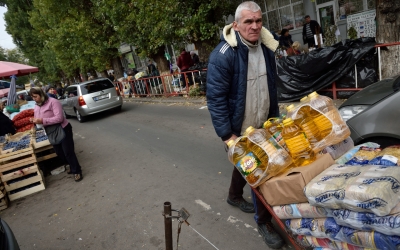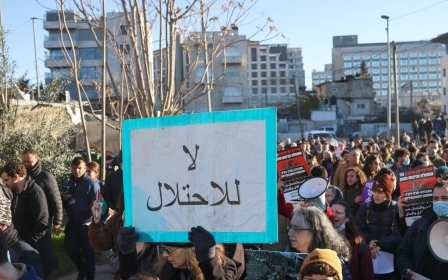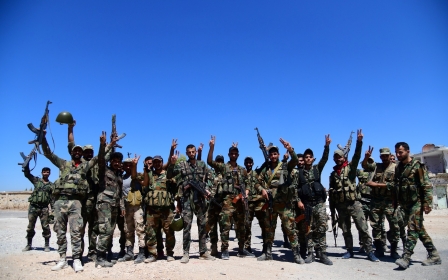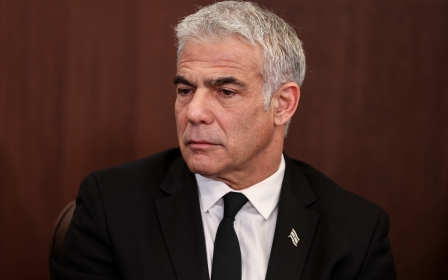Russia-Ukraine war: Moldova greets refugee influx with compassion and wariness

Natalia’s tears froze on her cheek as she was waiting for a bus to take her from Moldova’s border village of Palanca to the capital in Chisinau.
Sitting just 40km from Odessa, the 67-year-old Ukrainian refugee’s next stop is Moldexpo. Previously an international exhibition centre, it had been turned into a Covid testing facility, and is now being used as the main refugee reception and triage point in Moldova.
'It was terrible, they were bombing civilians and infrastructure with banned munitions. I saw how a bus with pregnant women was getting shot at'
- Natalia, Ukrainian refugee
Natalia escaped with her daughter Tatiana from Mykolaiv, a city in southern Ukraine that has been under Russian attack for more than a week now.
“It was terrible, they were bombing civilians and infrastructure with banned munitions,” Natalia told Middle East Eye. “I saw how a bus with pregnant women was getting shot at.”
She is just one of more than 300,000 Ukrainian refugees that, after traumatising events in Ukraine, have evacuated their home country in neighbouring Moldova. The eastern European country, long pulled between Russia and the European Union, has received four Ukrainian refugees for every 100 inhabitants, the most refugees per capita in Europe.
But Moldova, which has a population of 2.6 million, is buckling under the weight of the crisis, one it can only bear with the help of the international community.
While only an estimated 85,000 Ukrainian refugees have stayed in Moldova, the government expects about one million to enter the country in the coming months. The UNHCR, the UN's refugee agency, estimated that by July, there will be 100,000 Ukrainians settled as refugees in Moldova
It’s not just scarce financial resources that have been piling pressure on Moldova. While a lot of Moldovans have been hospitable and eager to help their neighbours as they flee violence, tensions between Ukrainian refugees and Moldovans have also been increasing.
Conservative politicians and some on social media have appeared to orchestrate an online campaign to paint the incoming refugees as disruptors, profiteers and “rude” people.
A combination of over-reliance on international aid, simmering social tensions and a looming threat from Russia have made Moldova, which is not a member of the EU or Nato, bear the biggest brunt of the Russian invasion of Ukraine.
Social tensions rising
At Palanca, Natalia has been welcomed by Moldovan volunteers working day and night to provide freshly arrived refugees with warm drinks, food and shelter, until they are picked up by transport to take them to the Moldexpo refugee centre.
From there, she and her daughter have the option to either go abroad or remain in Moldova. According to Moldova’s foreign minister, Nicu Popescu, the majority of refugees are being sheltered in people's homes.
Just 10,000 Ukrainian refugees are accommodated in reception centres, such as sports arenas or industrial halls, Popescu said.
However, Chisinau’s Mayor Ion Ceban, part of the pro-Russian socialist party in Moldova, has been touting a narrative that refugees pose “security risks” for Moldovan society. He’s asked the interior ministry to send police officers to patrol refugee reception centres.
“I pray that the security of people living in Chisinau, a risk area, is not jeopardised,” he said.
“We estimate that in the next period, because of our hospitality, we could end up with pretty bad things, starting with theft, robbing, abuses, vandalism, which are already taking place.”
According to Alina Radu, co-owner of Ziarul de Garda, a leading Moldovan investigative newspaper, "Ceban is just the tip of the iceberg, the rest you need a trained eye to see."
"He's Russia's henchman in Chisinau," she told MEE.
But some people believe his messages. Below Ceban's posts on social media, Moldovans are posting supportive comments.
“I think we’ll regret this… they’re very aggressive and are pretentious, I understand [the need to help] but this is going to[o] far,” one said.
“Moldovans, have a bit of dignity, treasure yourselves first and don’t wait for thanks from them, they don’t know this word,” said another.
Critical comments such as these have been mushrooming on social media, with people complaining about refugees and saying that authorities should take care of Moldovans who are also in need of help.
Radu is too familiar with the well-oiled Russian propaganda machine in Moldova, which is not new and dates back to the time when the country was part of the Soviet Union.
She conducted an analysis of dozens of such social media posts, expressing views that are not founded in reality.
"They're meant to make people upset at Ukrainians and suggest they're coming to Moldova or Romania to benefit from free things rather than to look for safety," she said.
President Maia Sandu urged citizens to not pay attention to these hate campaigns, which she said have the sole role of dividing society at a moment when unity is of utmost importance.
International aid stalling
Upon her arrival at Palanca, Natalia received a warm welcome, with food, tea and blankets provided mostly by volunteers, with transport being arranged by the government.
“We have much fewer resources to deal with that with any other neighbour of Ukraine,” said Popescu, Moldova’s foreign minister.
“We have institutions that are less prepared for it, less prosperous with smaller budgets, with fewer people and just less resilience.”
That is why, international financial and humanitarian aid are key to helping Moldova continue receiving refugees, even as a transit country.
Official visits from top EU, US and UN executives have strengthened the international community’s commitment to aid Moldova in receiving a large number of refugees.
“For a small country like Moldova, proportionately, this is a very large number,” Moldovan Prime Minister Natalia Gavrilita told US Secretary of State Antony Blinken during an official visit to Moldova last week.
Roland Schilling, the UNHCR's head of central Europe, was also present at the Palanca border crossing, where Natalia and hundreds of other refugees have made their first steps to safety.
He told Middle East Eye that the agency is trying to help Moldovans as well as the Ukrainian refugees.
“The most important thing will be setting up a new system for Ukrainian refugees who are poor to have actual cash,” said Schilling. “They will get cards and we will support them, but we will also help people in Moldova who help refugees, because we shouldn't forget that the host community is not a rich country and it also needs support.”
'People have managed the crisis well, despite the fact that this is a huge challenge for a country with limited resources'
- Janis Mazeiks, head of EU delegation
Schilling noted that civil society needs financial help to be able to sustainably host the refugees.
“The more the number increases, they will be less comfortable,” said Popescu, the foreign minister. “We don’t want to end up in a situation where we will house people in tents around the city.”
At the start of the Russian invasion, Moldova set up a bank account to collect funds to manage the large numbers of refugees coming in to the country. Two weeks later, the account had received almost $2m.
The group Peace for Moldova, which works in collaboration with the government, has also collected over 50,000 euros from donations.
“At the moment there’s a crisis for products, and there will be more urgent things we need that we’ll need to solve quickly as volunteers,” said Vlada Ciobanu from Peace for Moldova.
“There’s also a general exhaustion [among volunteers] but luckily things are a bit more organised.”
On 3 March, the EU also promised 15m euros and 5m euros in humanitarian aid in the form of supplies after EU executives visited Chisinau.
Janis Mazeiks, head of the EU delegation in Moldova, told MEE at Palanca that he was impressed with the efforts 0f both regular Moldovans and the government.
“People have managed the crisis well, despite the fact that this is a huge challenge for a country with limited resources," said Mazeiks.
But little of this financial help has reached Moldova as of last week, according to Stela Jemna, the chief of staff for Moldova’s prime minister.
Natalia, the recently arrived refugee, is particularly heartbroken because she never expected Russia to do this. Mykolaiv has been a place where Russians, Ukrainians and Belarusians have lived peacefully together, speaking Russian and living in mixed families.
“I’ve never been a nationalist, but now I can only say Slava Ukraina! I’m proud of our country and of our boys fighting on the frontlines,” she said.
Natalia is unsure what will happen next. For now, she is heading to her granddaughter’s place in Istanbul, from where she will decide. What she is sure of is that she’s not neutral about Vladimir Putin anymore.
“[Putin] stabbed us in the back, he’s horrible, he’s a fascist,” she said, as she boarded her bus to Chisinau.
Middle East Eye propose une couverture et une analyse indépendantes et incomparables du Moyen-Orient, de l’Afrique du Nord et d’autres régions du monde. Pour en savoir plus sur la reprise de ce contenu et les frais qui s’appliquent, veuillez remplir ce formulaire [en anglais]. Pour en savoir plus sur MEE, cliquez ici [en anglais].





